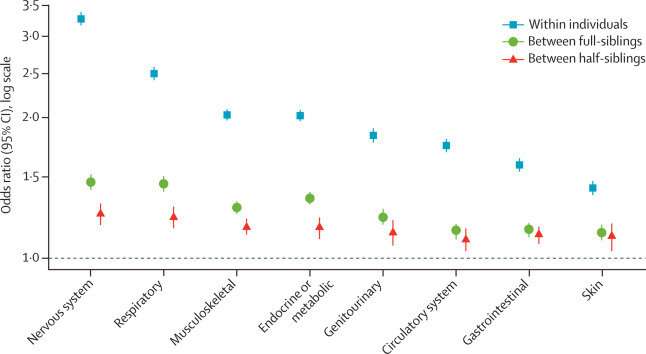
Adults with ADHD are at higher risk of a wide range of physical conditions, including nervous system, respiratory, musculoskeletal, and metabolic diseases, according to a large register-based study from Karolinska Institutet published in The Lancet Psychiatry.
“Identifying co-occurring physical diseases may have important implications for treating adults with ADHD and for benefiting the long-term health and quality of life of patients,” says lead author Ebba Du Rietz, postdoctoral researcher at the Department of Medical Epidemiology and Biostatistics, Karolinska Institutet.
ADHD is a common neuropsychiatric disorder characterized by inattention, impulsiveness and hyperactivity, and commonly treated with stimulant therapy (methylphenidates or amphetamines).
Four million individuals studied
Previous studies suggest increased risk for a number of physical health conditions in adults with ADHD, but only a limited number of these associations have been thoroughly researched. Moreover, detailed treatment guidelines for adults with ADHD and co-occurring physical disease are largely lacking. Now, researchers at Karolinska Institutet have examined possible associations between ADHD and a wide range of physical diseases in adulthood, and whether genetic or environmental factors are involved.
Over four million individuals (full-sibling and maternal half-sibling pairs) born between 1932–1995 were identified through Swedish registers and followed between 1973–2013. Clinical diagnoses were obtained from the Swedish National Patient Register. The researchers examined the risk of 35 different physical conditions in individuals with ADHD compared to those without, and in siblings of individuals with ADHD compared to siblings of those without.
Associated with many conditions
Individuals with ADHD had a statistically significant increased risk of all studied physical conditions except arthritis. The strongest associations were found for nervous system, respiratory, musculoskeletal, and metabolic diseases. The diagnoses most strongly associated with ADHD were alcohol-related liver disease, sleep disorders, chronic obstructive pulmonary disease (COPD), epilepsy, fatty liver disease and obesity. ADHD was also linked to a slightly increased risk of cardiovascular disease, Parkinson’s disease and dementia.
“These results are important because stimulant therapy requires careful monitoring in ADHD patients with co-occurring cardiac disease, hypertension and liver failure,” says senior author Henrik Larsson, professor at Örebro University and affiliated researcher at Karolinska Institutet.
Underlying genetic factors
The increased risk was largely explained by underlying genetic factors that contributed both to ADHD and the physical disease, with the exception of nervous system disorders and age-related diseases. Full siblings of individuals with ADHD had significantly increased risk for most physical conditions.
Source: Read Full Article
